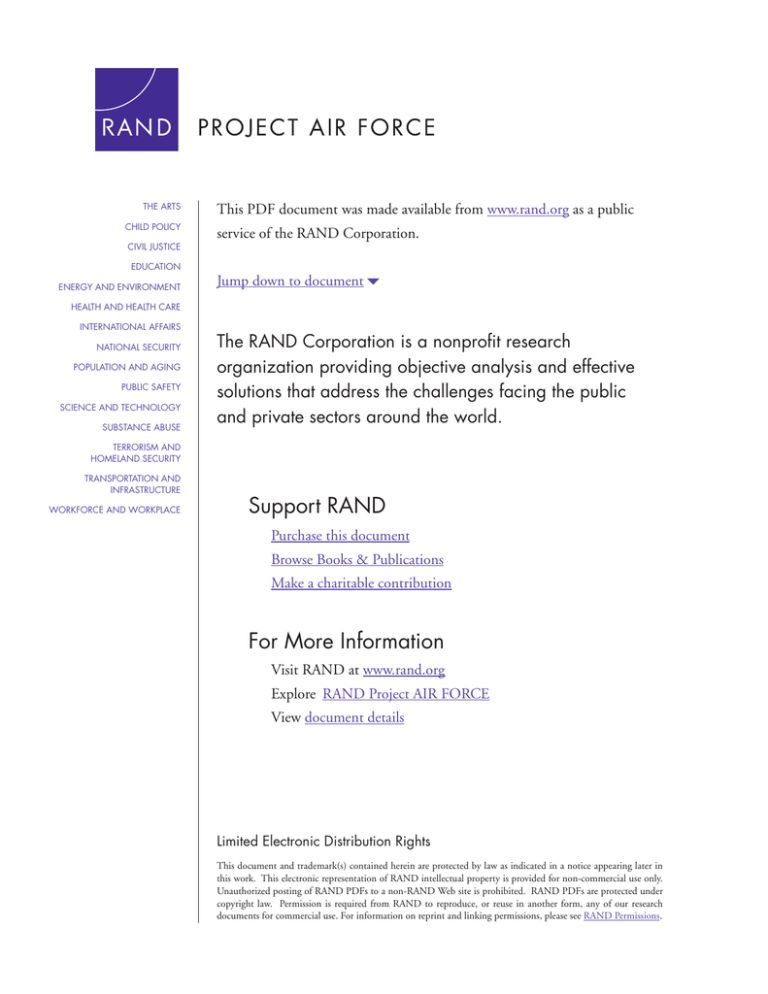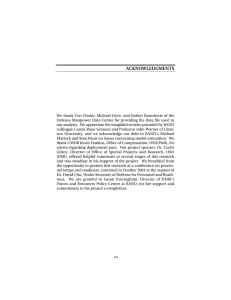
THE ARTS
CHILD POLICY
CIVIL JUSTICE
EDUCATION
ENERGY AND ENVIRONMENT
This PDF document was made available from www.rand.org as a public
service of the RAND Corporation.
Jump down to document6
HEALTH AND HEALTH CARE
INTERNATIONAL AFFAIRS
NATIONAL SECURITY
POPULATION AND AGING
PUBLIC SAFETY
SCIENCE AND TECHNOLOGY
SUBSTANCE ABUSE
The RAND Corporation is a nonprofit research
organization providing objective analysis and effective
solutions that address the challenges facing the public
and private sectors around the world.
TERRORISM AND
HOMELAND SECURITY
TRANSPORTATION AND
INFRASTRUCTURE
WORKFORCE AND WORKPLACE
Support RAND
Purchase this document
Browse Books & Publications
Make a charitable contribution
For More Information
Visit RAND at www.rand.org
Explore RAND Project AIR FORCE
View document details
Limited Electronic Distribution Rights
This document and trademark(s) contained herein are protected by law as indicated in a notice appearing later in
this work. This electronic representation of RAND intellectual property is provided for non-commercial use only.
Unauthorized posting of RAND PDFs to a non-RAND Web site is prohibited. RAND PDFs are protected under
copyright law. Permission is required from RAND to reproduce, or reuse in another form, any of our research
documents for commercial use. For information on reprint and linking permissions, please see RAND Permissions.
This product is part of the RAND Corporation documented briefing series. RAND
documented briefings are based on research briefed to a client, sponsor, or targeted audience and provide additional information on a specific topic. Although documented
briefings have been peer reviewed, they are not expected to be comprehensive and may
present preliminary findings.
Compensating for
Incomplete Domain
Knowledge
Lynn M. Scott, Steve Drezner,
Rachel Rue, Jesse Reyes
Prepared for the United States Air Force
Approved for public release; distribution unlimited
The research described in this report was sponsored by the United States Air Force under
Contract F49642-01-C-0003 and FA7014-06-C-0001. Further information may be
obtained from the Strategic Planning Division, Directorate of Plans, Hq USAF.
The RAND Corporation is a nonprofit research organization providing objective analysis
and effective solutions that address the challenges facing the public and private sectors
around the world. RAND’s publications do not necessarily reflect the opinions of its
research clients and sponsors.
R® is a registered trademark.
© Copyright 2007 RAND Corporation
All rights reserved. No part of this book may be reproduced in any form by any electronic or
mechanical means (including photocopying, recording, or information storage and retrieval)
without permission in writing from RAND.
Published 2007 by the RAND Corporation
1776 Main Street, P.O. Box 2138, Santa Monica, CA 90407-2138
1200 South Hayes Street, Arlington, VA 22202-5050
4570 Fifth Avenue, Suite 600, Pittsburgh, PA 15213-2665
RAND URL: http://www.rand.org/
To order RAND documents or to obtain additional information, contact
Distribution Services: Telephone: (310) 451-7002;
Fax: (310) 451-6915; Email: order@rand.org
Summary
Preparing senior leaders to take charge of organizations in functional domains in which they
have limited operational or functional experience is an important issue for the Air Force. Ideally, all senior leaders are fully qualified for their positions, but, for a number of reasons, this
is not always possible. First, many senior leader positions require experience in more than one
functional or operational domain, but it is difficult to develop a corps of senior leaders with
all the required combinations of domain knowledge. Next, the emergence of new weapon
systems, technologies, and operating environments continues to create the need for expertise
that is in short supply among senior leaders. Finally, as part of a long-term career-development
strategy, the Air Force frequently assigns senior leaders to operational and functional domains
in which they lack experience.
When senior leaders have incomplete domain knowledge, ranging from a little to none,
they are challenged to use their existing skills and experience to become engaged and to begin
adding value to their organizations as soon as possible. We have identified a particularly useful
set of knowledge, skills, and abilities that these leaders use to achieve that goal, what we call
compensating competencies. As we reviewed the current and future challenges Air Force senior
leaders face, we concluded that the Air Force could benefit from an in-depth understanding of
the characteristics of these competencies and how senior leaders use them.
The purpose of the study was to identify and characterize compensating competencies and
to provide an in-depth understanding of how senior leaders use them in their jobs. Although
it would have been useful to correlate the use of these competencies to objective or subjective measures of leader performance, such measures were not available to us. We interviewed
27 senior leaders, across all general officer ranks and senior executive tiers, to gather detailed
examples of the knowledge, skills, and abilities they use to deal with the critical demands of
their jobs. The content of the interview findings helped us identify the compensating competencies that were prevalent among these senior leaders and group into four distinct categories:
enterprise knowledge, integration skills, problem-solving skills, and people skills. Enterprise knowledge consists of an understanding of how the leader’s organization fits into the parent organization and how it relates to its external environment. Integration skills are used to create or
improve interactions among experts, processes, functions, organizations, and/or capabilities.
Problem-solving skills help senior leaders reduce the complexity of their decision space. People
skills address power relationships between subordinates to create productive information flows.
Collectively, these compensating competencies help senior leaders (1) manage the complexity
surrounding stakeholder relationships and political, hierarchical, and technical operating envi-
vii
viii
Compensating for Incomplete Domain Knowledge
ronments; (2) recognize or create synergies with other organizations; (3) motivate inputs from
subordinates that contribute to problem solving, decisionmaking, and learning the technical
domain; and (4) accelerate leaders’ rates of learning.
Our analysis identified how senior leaders with incomplete domain knowledge use compensating competencies to gain domain knowledge and create decisionmaking and solutiondevelopment processes within their organizations. Enterprise knowledge compensates by
providing a strategic orientation to problems and issues, enabling the development of comprehensive solutions and the learning of the organizational processes and relationships that are
associated with the domain. Integration skills improve decisionmaking and learning processes.
These skills also contribute to learning domain and enterprise knowledge and allow a senior
leader to maximize the interaction among subordinate experts to enhance the leader’s ability
to generate robust problem definition and solution development in the particular organization. Problem-solving skills are important for every leader. Applying problem-solving skills at
the senior level helps the leader identify the data and information that are central to defining
problems and developing comprehensive solutions. The act of using problem-solving skills for
domain-specific problems and issues also helps senior leaders gain domain knowledge. Senior
leaders with insufficient domain knowledge use people skills to maximize the participation of
their staff for decisionmaking and learning. These skills help remove barriers to communication from subordinates, creating an organizational climate that allows them to feel comfortable
and empowered to approach senior leaders to bring up problems and to teach leaders what they
need to know.
We also found that these competencies are useful to all the senior leaders we interviewed.
These competencies not only assist senior leaders who have incomplete domain knowledge
with learning an unfamiliar domain but are also useful for senior leaders with high amounts of
domain knowledge. Senior leaders with domain knowledge use the competencies immediately
to formulate solutions with subordinate experts, perform complex integrations, and facilitate
the application of proven domain-specific problem solving strategies.
Because of the broad utility of compensating competencies among the senior leaders we
interviewed, we recommend that the Air Force take steps to develop a deep pool of leaders who
are proficient in these competencies within its education and development programs. Curricula
designed around developing organizational analysis techniques, systems-level problem-solving
strategies, and communication-analysis skills would be most instrumental to developing compensating competencies. Such an approach would augment the benefits already gained from
broadening assignments. In return, the Air Force will have established a hedging strategy for
developing leaders and staff members who can cope in a wider variety of organizations and
operating domains in the future.






